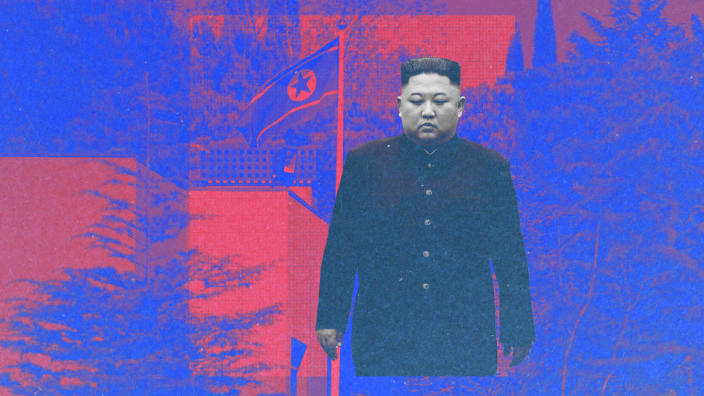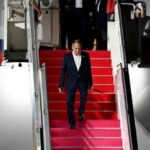
Three days before Christmas 2006, a 22-year-old Yale graduate from San Diego named Adrian Hong walked into a Kentucky Fried Chicken in Shenyang, China, flanked by two other Americans, women who were members of Hong’s group Liberty in North Korea. Hong had founded the organization a few years earlier, while still an undergraduate, to spotlight the human rights atrocities of the so-called “hermit kingdom,” whose border with China was a few hundred miles southeast of Shenyang. He entered college a young man in search of a cause and became obsessed with North Korea. At first, he organized protests and community engagement exercises, but he quickly ramped things up.
Accompanying Hong and the American women that day in Shenyang were six North Korean escapees, including two orphan boys aged sixteen and seventeen, three women in their forties, and a woman in her twenties.
The plan was to walk the group into the American consulate so they could claim asylum and travel to the United States to restart their lives, but officials in the embassy told Hong they wouldn’t accept the North Koreans. Hong and his group tried to go to Beijing instead to ask for help from the United Nations, but they were all arrested by Chinese police before they had a chance.
Hong barely got out of that scrape because he’d hidden a phone in the collar of his hoodie, allowing him to call American politicians and officials to let them know what had happened. The North Koreans were eventually released and allowed to move to the United States, but the experience hardened Hong’s views that to make a real difference when it came to the situation in North Korea, he and his volunteers would have to do everything themselves.
Kim Jong Un Inches Closer to All-Out War Than Ever Before
Nearly 13 years later, Adrian was still obsessively focused on North Korean and its human rights abuses—but his ambitions had grown much larger: taking down the North Korean regime itself, one defector at a time. This time, the stakes would be even higher.
On a Cool Friday afternoon in late winter in 2019, he showed walked up to the door of the North Korean embassy in Madrid and pressed the buzzer.
“¿Sí?” a voice said through the intercom after a few minutes. “Good afternoon, my name is Matthew Chao,” the man outside replied in good Spanish, explaining he’d been there several weeks earlier and had returned with a gift for “Señor So,” citing the name of the embassy’s highest-ranking official. Chao was a false name Adrian Hong had created for the mission.
The embassy was a burnt-orange compound in Madrid’s Valdemarín quarter, a posh district known for its parks and luxurious residences. The diplomatic compound looked more like the estate of a rich if perhaps paranoid Spaniard than the office-like quarters of the city’s other embassies. The discreet entry gate was set back from the sidewalk and flanked by an imposing wall. Little could be seen from the road, and most people in the neighborhood walked by without giving the building a second thought. The embassy received few visitors.
Now, however, hearing the name of his boss, the North Korean worker, a thirty-year-old embassy employee called Jin Choe, who was gardening when the buzzer rang, cracked open the door. Seeing a smiling, dapper Asian man wearing a black suit with a polka-dot tie and two shopping bags with gifts, Jin allowed him in. “I’ll find Mr. So,” he said, pointing the visitor to a seat on a bench inside the door. The time was just after 4:30 p.m.
As Jin went in search of Mr. So, outside the embassy walls an older woman resting at a bus stop was observing a different scene, one that would have caused the junior diplomat to shut the door and run for safety. Concealed against a wall near the embassy’s front door stood another five men dressed casually in blue jeans and sunglasses. Some of them wore large black backpacks. Several were crouching as if they were about to spring into the building.
The entrance to the North Korean Embassy on March 27, 2019 in Madrid, Spain.
” data-src=”https://s.yimg.com/ny/api/res/1.2/0ezFCnZvFE8eOVKJwBjStg–/YXBwaWQ9aGlnaGxhbmRlcjt3PTcwNTtoPTQ3MA–/https://media.zenfs.com/en/thedailybeast.com/a47d6d181ed54f09e8f38249ef14b4bb”><img alt="
The entrance to the North Korean Embassy on March 27, 2019 in Madrid, Spain.
” src=”https://s.yimg.com/ny/api/res/1.2/0ezFCnZvFE8eOVKJwBjStg–/YXBwaWQ9aGlnaGxhbmRlcjt3PTcwNTtoPTQ3MA–/https://media.zenfs.com/en/thedailybeast.com/a47d6d181ed54f09e8f38249ef14b4bb” class=”caas-img”>
The entrance to the North Korean Embassy on March 27, 2019 in Madrid, Spain.
Pablo Blazquez Dominguez/Getty Images
A few moments after Jin disappeared, the man calling himself Matthew Chao rose from the bench and quietly opened the door behind him. The men waiting outside slipped inside. As they crossed the threshold onto North Korean grounds, several of the intruders pulled on black balaclavas and began running. They drew pistols and handcuffs from their bags, speaking to each other over a walkie-talkie app on their mobile phones and wireless headphones.
The intruders dispersed throughout the building, yelling at the startled staff to drop to the ground. After fastening their hands with plastic ties and handcuffs and placing bags over their heads, the masked men corralled the workers into a meeting room. Mr. So, whose full name is So Yun-suk, was initially pulled into a bathroom, while his wife—who had tried at first to barricade herself and their child in a bedroom—was guarded by a man upstairs without any restraints.
The intruders then went room by room, learning the layout of the embassy and ensuring no one was hiding in a closet or unused office. Most rooms were startlingly spare considering the building was home to four diplomatic staff as well as two of their wives and one young boy.
They charged into a propaganda room, whose walls were covered in North Korean ideological posters and stylized pictures of the three generations of the Kim dynasty, who have ruled the country since its founding in 1948 following the partitioning of Korea by the United States and the Soviet Union in 1945. The diplomats would be expected to gather in the room daily to read and recite ideological material praising their leader, Kim Jong-un, as well as his father and grandfather, as deities protecting the proud country from evildoers around the world, especially the United States.
Down one hallway, the embassy raiders came upon a chamber purported to exist in every North Korean embassy around the globe, a space few if any foreigners had ever set their eyes on: the intelligence center, featuring a computer, stacks of papers, and foil-lined walls intended to prevent the prying of Western intelligence agencies. Here the diplomats would receive orders from their superiors in North Korea via their own cryptographic system.
Within fifteen minutes, the group had taken control of the embassy and secured the premises. Or so they thought. Not all was what it seemed—both to the intruders and to the captives.
One of the North Korean hostages later told Spanish police that the man putting on his wrist tie couldn’t figure out how it worked at first and required help from another of the men, an odd shortcoming for what he automatically assumed was the work of an elite paramilitary group seizing control of the embassy.
With their terrified captives tied up, the intruders dashed through the rooms again, sweeping everything they could, including USB sticks, two computers, a mobile phone, documents, and two hard drives, into a backpack. One of the hard drives was connected to the embassy’s surveillance system, so taking it was meant to eliminate any evidence the men had been inside.
With the rest of the embassy staff terrified and tied up in the meeting room, Matthew Chao led So Yun-suk into the basement.
But there was a problem. What the intruders didn’t know is that they’d missed someone, Cho Sun-hi, wife of one of the officials and the unknown, seventh resident of the embassy. Hearing men with South Korean accents storming into the embassy, she panicked.
North Koreans have been in a declared state of war with South Korea since 1950, so any unexpected interaction with a South Korean has the potential to create a visceral panic. From the time they are toddlers, North Koreans are taught that the United States and South Korea are “cannibals” bent on destroying the great North Korean state. As the men went room to room, kicking down doors, Cho escaped onto the terrace outside her room on the second floor. Fearing for her life, she decided to jump. Dropping onto the concrete below, she landed hard, injuring her head and leg.
In pain but undeterred, Cho hobbled across a paddle tennis court and out a side door with a small path onto the main road. By the time she reached the road, she was crawling on all fours.
A gym worker driving through the usually sleepy neighborhood of Madrid nearly swerved into the curb when he saw a woman with blood dripping over her face screaming beside the road. He pulled over to help, later telling police he thought she’d been badly assaulted. He drove her to a clinic just down the road, where a staff member called an ambulance and the police. The woman was in a hysterical state, anguished words streaming out of her mouth, all but unintelligible to the Spaniards.
When police officers soon arrived, they struggled to determine where the distressed woman had come from. They tried calling the Chinese embassy but realized she couldn’t speak Chinese. One of the doctors used Google Translate to decipher her words. Finally, the officers understood; the woman was from the North Korean embassy, just up the road. But what she was telling them made little sense.
“Some people have entered the embassy and are killing and eating people,” Cho was screaming. “There are children in there.”
Back at the embassy, it had been only an hour since the masked men had stormed the building. During that time, Matthew Chao and his crew had tied up the staff, grabbed a ream of documents, and even quickly staged and filmed a video that involved smashing portraits of the former North Korean leaders on the ground.
About half an hour later, the intruders froze at the sound of the embassy’s door buzzer. It was the police. Composing himself—and placing a “Dear Leader” pin, a red North Korean flag with portraits of Kim Jong-un’s forefathers, on his suit jacket—Chao headed to the door.
” data-src=”https://s.yimg.com/ny/api/res/1.2/rdPc8zEnBcSY31HOLw6sLg–/YXBwaWQ9aGlnaGxhbmRlcjt3PTcwNTtoPTM5Ng–/https://media.zenfs.com/en/thedailybeast.com/704f11bfc42e7a3d7b572e5c67784aa6″><img alt="
” src=”https://s.yimg.com/ny/api/res/1.2/rdPc8zEnBcSY31HOLw6sLg–/YXBwaWQ9aGlnaGxhbmRlcjt3PTcwNTtoPTM5Ng–/https://media.zenfs.com/en/thedailybeast.com/704f11bfc42e7a3d7b572e5c67784aa6″ class=”caas-img”>
The Daily Beast
Affecting the tone of a haughty and standoffish official, he opened the door to confront three Madrid police officers wearing sunglasses. They explained to Chao that an injured woman had been found on the street and was howling that something bad was happening inside the embassy.
Feigning bureaucratic nonchalance, Chao explained that if police wanted to interact with the embassy, they must go through the appropriate channels. Then he shut the door.
But who had called the police to the embassy in the first place? As the intruders raced to determine the leak in their airtight plan, it dawned on them: they’d missed someone. Someone had gotten away, someone they didn’t know lived in the embassy until this moment.
They’d now been in the embassy for more than two hours. The original plan was to stay for no longer than forty-five minutes.
Ring. Ring. Ring.
Suddenly the phones in the embassy started to ring incessantly. The men tried to ignore them as they continued to try to convince So Yun-suk everything would be fine once they got on their way.
But whoever was calling was incessant, dialing again and again for hours. The sound filled the embassy’s cavernous interiors, devoid of much furniture or carpeting. As afternoon turned to night, the masked men exchanged increasingly worried glances.
The North Koreans, sitting on the floor, shuffled uncomfortably. Did the ringing signal help or further danger? They were still unable to see because of the bags over their heads.
In the basement, So Yun-suk, the embassy’s top North Korean official, stared with a pained expression at the man calling himself Matthew Chao.
“You can’t keep me safe, Adrian,” he declared, with an air of resignation. “You have to leave. Now.”
From the book THE REBEL AND THE KINGDOM: The True Story of the Secret Mission to Overthrow the North Korean Regime by Bradley Hope. Copyright © 2022 by Bradley Hope. Published by Crown, an imprint of Random House, a division of Penguin Random House LLC. All rights reserved.
Get the Daily Beast’s biggest scoops and scandals delivered right to your inbox. Sign up now.
Stay informed and gain unlimited access to the Daily Beast’s unmatched reporting. Subscribe now.




